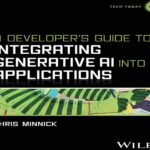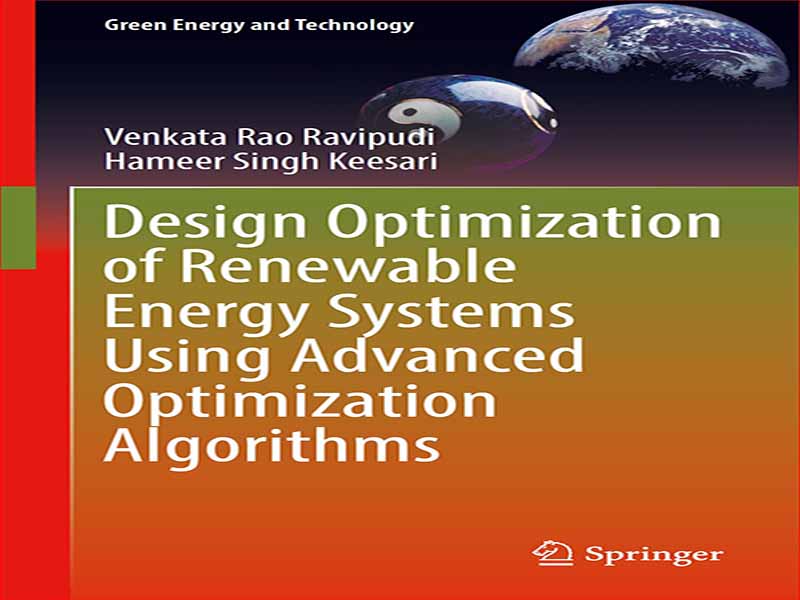- عنوان مجله: Design Optimization of Renewable Energy Systems Using Advanced Optimization Algorithms
- نویسنده: Venkata Rao Ravipudi
- حوزه: َانرژی تجدید پذیر
- سال انتشار: 2022
- تعداد صفحه: 395
- زبان اصلی: انگلیسی
- نوع فایل: pdf
- حجم فایل: 6.57 مگابایت
گرم شدن کره زمین یک نگرانی مهم است که نیاز به تولید پاک تر انرژی را افزایش می دهد. منابع انرژی تجدیدپذیر منابع مهمی برای کمک به چنین نیازهای انرژی پاک هستند. بهره گیری از این منابع انرژی تجدیدپذیر فرصت های قابل توجهی را برای رسیدگی به مشکلات مرتبط با انرژی فراهم می کند. در چند دهه اخیر، محققان بر روی منابع انرژی تجدیدپذیر مانند انرژی خورشیدی، انرژی زیستی، انرژی امواج، انرژی حرارتی اقیانوس ها، انرژی جزر و مد، انرژی زمین گرمایی و انرژی باد تمرکز کرده اند. این منجر به توسعه تکنیک ها و ابزارهای جدیدی شده است که می تواند انرژی را از منابع انرژی تجدید پذیر برداشت کند. با این حال، برای برآوردن نیازهای انرژی و کاهش سرمایه گذاری، مطالعه دقیق سیستم های استخراج انرژی مورد نیاز است. شناسایی، تجزیه و تحلیل و بهینه سازی اثر پارامترهای مختلف یک سیستم انرژی تجدیدپذیر به طور قابل توجهی به ارزیابی عملکرد سیستم کمک می کند. علاوه بر این، ارائه پارامترهای بهینه سیستم تنها با در نظر گرفتن یک هدف، همیشه ترجیح داده نمیشود، زیرا این سیستمها اهداف متعددی مانند توان خروجی، کارایی سیستم، هزینه سرمایهگذاری و عوامل اقتصادی و اکولوژیکی دارند. از این رو، محققان مدلهای بهینهسازی مختلفی از این سیستمها را توسعه دادهاند و پارامترهای بهینه سیستم را از طریق بهینهسازی تک هدفه و چند هدفه با استفاده از الگوریتمهای بهینهسازی پیشرفته ارائه کردهاند. همه الگوریتمهای محاسبات تکاملی و بهینهسازی مبتنی بر هوش ازدحامی، الگوریتمهای مبتنی بر جمعیت هستند و دارای پارامترهای کنترلی مانند اندازه جمعیت، احتمال متقاطع، احتمال جهش، ضریب مقیاس، وزن اینرسی، پارامترهای اجتماعی و شناختی و غیره هستند. تنظیم مناسب پارامترهای کنترل، همگرایی الگوریتم را به سمت بهینه جهانی دیکته می کند. تنظیم نامناسب پارامترهای کنترل منجر به همگرایی زودرس و افزایش تلاش های محاسباتی می شود. همچنین، انتخاب یک اندازه جمعیت مناسب برای برنامههای بهینهسازی مختلف، کار خستهکنندهای است. علاوه بر این، در بهینهسازی چند هدفه، انتخاب مناسبترین راهحل از مجموعه راهحلهای غیر غالب دشوار است. در این کتاب، الگوریتمهای Jaya و Rao (Rao-1، Rao-2 و Rao-3) که اخیراً توسعه یافتهاند، برای بهینهسازی تک و چند هدفه سیستمهای انرژی تجدیدپذیر انتخاب شده توضیح داده شدهاند. علاوه بر این، انواع الگوریتم های Jaya و Rao برای نشان دادن بهبود عملکرد ارائه شده است. علاوه بر این، انواع الگوریتم جایا، یعنی الگوریتم هدایت اغتشاش چند تیمی جایا (MTPG-Jaya) و الگوریتم هدایت اغتشاش چند تیمی تطبیقی جایا (AMTPG-Jaya) و انواع الگوریتم های رائو، یعنی elitistRao (ERao-) الگوریتمهای ERao-2 و ERao-3 و الگوریتم جمعیت خودسازگار Rao (SAP-Rao)، برای بهینهسازی سیستمهای انرژی تجدیدپذیر انتخاب شده نشان داده شدهاند. این الگوریتم ها هیچ پارامتر خاص الگوریتمی ندارند و فقط به پارامترهای کنترلی رایج نیاز دارند. علاوه بر این، کاربرد روشهای تصمیمگیری چند ویژگی در مسائل بهینهسازی چندهدفه مورد بحث قرار میگیرد و یک روش تصمیمگیری بر اساس رتبه متوسط برای شناسایی بهترین راهحل در جبهه پارتو توصیه میشود.
Global warming is a significant concern that raises a need for cleaner production of energy. Renewable energy resources are significant sources of contribution to such clean energy demands. Taking advantage of these renewable energy sources provides significant opportunities for handling energy-related problems. In the last few decades, researchers have focused on renewable energy resources like solar energy, bioenergy, wave energy, ocean thermal energy, tidal energy, geothermal energy, and wind energy. This has resulted in the development of new techniques and tools that could harvest energy from renewable energy sources. However, to meet energy demands and reduce investment, a rigorous study of energy extraction systems is required. Identifying, analyzing, and optimizing the effect of various parameters of a renewable energy system contribute significantly to assessing the system performance. Furthermore, it is always not preferable to present the optimum system parameters considering only a single objective as these systems have multiple objectives such as power output, system efficiency, investment cost, and economic and ecological factors. Hence, researchers have developed various optimization models of these systems and presented optimum system parameters through single- and multi-objective optimization using advanced optimization algorithms. All evolutionary computation and swarm intelligence-based optimization algorithms are population-based algorithms and have control parameters such as population size, crossover probability, mutation probability, scaling factor, inertia weight, social and cognitive parameters, among others. Appropriate adjustment of the control parameters dictates the algorithm convergence toward the global optimum. Inappropriate adjustment of the control parameters leads to premature convergence and increased computational efforts. Also, selecting an appropriate population size for different optimization applications is a tedious job. Additionally, in multi-objective optimization, selecting the most suitable solution from non-dominated solution set is difficult. In this book, recently developed Jaya and Rao (Rao-1, Rao-2, and Rao-3) algorithms are described for single- and multi-objective optimization of selected renewable energy systems. In addition, variants of the Jaya and Rao algorithms are presented to show the improvement in performances. Furthermore, variants of the Jaya algorithm, namely multi-team perturbation guiding Jaya (MTPG-Jaya) algorithm and adaptive multi-team perturbation guiding Jaya (AMTPG-Jaya) algorithm, and variants of the Rao algorithms, namely elitistRao (ERao-1, ERao-2, and ERao-3) algorithms and self-adaptive population Rao (SAP-Rao) algorithm, are demonstrated for optimization of the selected renewable energy systems. These algorithms have no algorithm-specific parameters and require only the common control parameters. Additionally, the applicability of multi-attribute decision-making methods in multiobjective optimization problems is discussed, and a decision-making procedure is recommended based on average rank to identify the best solution in a Pareto-front.
این کتاب را میتوانید از لینک زیر بصورت رایگان دانلود کنید:
Download: Design Optimization of Renewable Energy Systems Using Advanced Optimization Algorithms



































نظرات کاربران